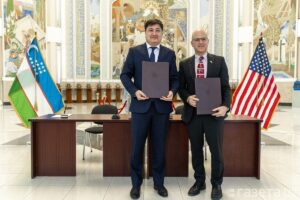
Chairman of the Customs Committee of Uzbekistan Akmalhuzha Mavlonov met with U.S. Customs and Border Protection Commissioner Troy Miller in Washington, DC.
This is the first time in 32 years that Uzbekistan and the United States have held an official face-to-face meeting of this format between the heads of the two countries’ customs services.
Important agreements reached during the Uzbek-American summits in 2018 and 2023 paved the way for expanding mutual cooperation in all areas.
According to the agency, Uzbekistan’s foreign trade in US goods has increased by 48% over the past 6 years. For 8 months of this year, this figure increased by 64% compared to the same period last year.
It is emphasized that in order to increase these indicators, it is necessary to stimulate the expansion of foreign trade by establishing mutual cooperation and information exchange between the customs services of both countries.
That is why the negotiations focused on such pressing issues as monitoring risks at customs, digitalization of customs procedures and efficient use of human resources.
The heads of the customs services of the two countries signed an agreement on cooperation and mutual assistance, which is an important legal basis for cooperation in the field of customs. This document, which opens a new page in the relationship, provides for the exchange of information between Uzbekistan and the United States in the field of customs and serves to further strengthen cooperation in the fight against drug trafficking, human trafficking, transnational criminal groups, money laundering and customs evasion.
It is noteworthy that the United States has signed similar bilateral customs cooperation agreements with only 17 countries out of 200, and Uzbekistan is the 18th country on this list.
During the talks, the parties discussed in detail the possibilities of attracting specialists from the U.S. border and customs services to Uzbekistan, as well as the possibility of training Uzbek specialists in the United States.
During the visit, the Uzbek delegation is scheduled to familiarize itself with the activities of the U.S. National Targeting Center, the Academy of Cynology, San Antonio International Airport in Texas, the auto-border customs post in Laredo on the border with Mexico, and the Texas-Mexico international railroad crossing.
https://president.uz/ru/lists/view/7559
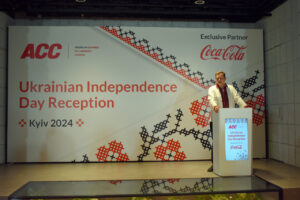
On August 21, 2024, the American Chamber of Commerce in Ukraine (AmCham Ukraine) held a reception in Kyiv to celebrate Ukraine’s Independence Day. The event brought together AmCham members, diplomats, and business representatives, becoming an important event in the capital’s business life.
The event began with greetings from AmCham leadership. AmCham President Andy Hunder emphasized the importance of partnership between Ukraine and the United States and expressed confidence in further development of bilateral economic relations. Special attention was paid to the challenges facing Ukrainian business in the context of the ongoing war and global economic instability.

Today, AmCham Ukraine unites over 600 member companies, making it one of the largest and most influential business associations in Ukraine. To effectively protect business interests and address key issues in various sectors of the economy, the Chamber has 24 specialized committees covering such areas as finance, IT, healthcare, agribusiness, and others.
AmCham Ukraine’s Board of Directors plays an important role in managing the organization, providing strategic recommendations and professional expertise. The Board consists of:
Executive Committee:
Olena Koszarny – Chair of the Board (Horizon Capital)
Arvid Turkner – Vice Chair (EBRD)
Alex McWhorter – Deputy Chairman of the Board (Citi Ukraine)
Sergiy Martynchuk – Treasurer (Cisco)
Sergiy Chorny – Legal Counsel and Secretary (Baker McKenzie)
Directors:
Yulia Badritdinova – General Director, McDonald’s Ukraine
Vasyl Bovdilov – General Director, Unilever Ukraine
Mikhail Bubnov – CEO, Schneider Electric Ukraine
Oleg Khaidakin – CEO, Carlsberg Ukraine
Michael Kharenko – Partner, Sayenko Kharenko
Leonid Polupan – CEO, Microsoft Ukraine
Petro Rondiyak – Chairman of the Board of Directors, Winner Group Ukraine
Andrzej Ruzicki – CEO, Bunge Ukraine
Olena Sereda – Director of Corporate Affairs and Legal Affairs, Coca-Cola Ukraine
Andriy Tsymbal – CEO, KPMG Ukraine
Vasyl Varvaroi – General Director, Cargill Ukraine
The reception, organized by the American Chamber of Commerce in Ukraine, demonstrated the unity and commitment of Ukrainian business to develop in the face of global challenges. The event once again emphasized the importance of international partnership and AmCham Ukraine’s role in supporting economic stability and growth in the country.
Interfax-Ukraine is a member of the American Chamber of Commerce in Ukraine and an official service provider of AmCham Ukraine.

Some 94% of Ukrainians consider Poland a friendly country, 86% consider the United States friendly, 85% – the UK, 80% – Germany, 40% – Turkey, and 5% – China, according to a poll by the Rating sociological group in cooperation with public organization Transatlantic Dialogue Center.
At the same time, 2% of Ukrainians consider Poland a neutral country, 7% consider the United States neutral, 6% the UK, 14% Germany, 48% Turkey, and 52% China.
In addition, 1% of Ukrainians consider Poland to be an enemy country, 2% consider the United States to be an enemy, 1% – the UK, 2% – Germany, 4% – Turkey, and 34% – China.
The attitude towards Germany among Ukrainians has improved, as the percentage of assessment of its friendly country has increased from 65% last year to 80% this year.
“The attitude of Ukrainians towards China and Turkey is deteriorating in dynamics. If in October last year, China was considered rather a neutral country (63%), this assessment changed to a more neutral-negative one: 34% rated it as a hostile country, 52% as neutral. As for Turkey, its assessment as a neutral country has increased: 48% consider it neutral, 40% – friendly, while last year its assessment as a friendly country (51%) was more than neutral (39%),” the sociological group said.
The survey was conducted on June 1-2, 2023 among citizens aged 18 years and older in all regions, except for the temporarily occupied territories of Crimea and Donbas, as well as territories where there is no Ukrainian mobile communication at the time of the survey. The sample is representative in terms of age, gender, and type of settlement. The sample was 1,000 respondents. The survey method is computer-assisted telephone interviewing (CATI). The error is no more than 3.1%.
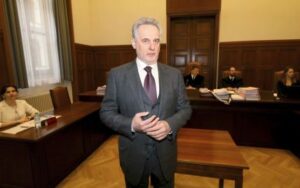
The Vienna highest state court (Wiener Oberlandesgericht, OLG) decided on Friday to reconsider the extradition case against Dmytro Firtash to the US and return the case to the court of first instance.
“The February 2017 decision of the Vienna District Court (on Firtash’s extradition) has been reversed. Now the Vienna State Criminal Court (OG) will re-examine the question of the admissibility of extradition on the basis of new evidence,” the court said in a press release
The statement issued by Group DF, which unites the assets of the Ukrainian businessman, also said that the first instance court will consider the case based on new evidence and facts provided by the parties and that Firtash’s extradition is now stopped.
According to the lawyer of the Ukrainian businessman Dieter Böhmdorfer (Dieter Böhmdorfer), which are cited in the report, the defense has been seeking this decision since June 2019.
“Dmitry Firtash is grateful to the independent Austrian judicial system for the objective consideration of the case and quite logically – the appointment of a retrial on the basis of new facts and evidence provided to the court,” the lawyer pointed out.
The press service of Group DF and the lawyers would not comment on the details of the court battles and arguments to persuade the Austrian court to make an objective decision, the release said
As reported, the head of the Board of Group DF Firtash was arrested in Austria on March 12, 2014 at the request of the US authorities, issued in 2013, but then released on bail of EUR125 million. Under the US administration of Barack Obama, the Ukrainian businessman was accused that he wanted to obtain permits for titanium mining in India for the subsequent sale of finished products in the USA to Boeing with the help of bribes totaling $18.5 million. Firtash denies all accusations and calls them politically motivated, aimed at limiting his influence on the processes in Ukraine.
In April 2015, the OG rejected the request of the US Ministry of Justice for the extradition of Firtash, indicating that it is impossible to rule out political motives for the extradition request. However, in February 2017, the OLG reconsidered this decision on a complaint from the prosecutor’s office, and in June 2019, the Austrian Supreme Court (OGH) confirmed the legality of the extradition.
After that, the Austrian Ministry of Justice issued a corresponding ruling on extradition, but the process was suspended in July 2019 due to the Ukrainian businessman’s defense request to the OGH for a new review, taking into account additional data collected. According to Kurier, the OG decision was delayed due to the large number of documents submitted, communication problems due to the coronavirus and due to the change of judges.
In March 2022, Firtash’s lawyers reportedly filed an appeal with the OLG against the OG’s decision to reject the request for a retrial of the businessman’s extradition to the United States.
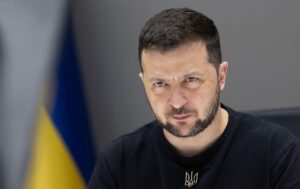
Ukrainian President Volodymyr Zelenskyy has held a meeting with a delegation of politicians, businessmen and representatives of United States charities led by former US Secretary of State Mike Pompeo.
The head of state noted the importance of such visits and meetings, which are a powerful signal of support for Ukrainians in our fight for freedom and democracy, the press service of the Office of the President reported Tuesday.
“I’m glad to see you have come with your friends,” the president said, addressing Mike Pompeo. – Comprehensive American support is very important to us.”
During the meeting, the head of state invited American business to actively invest in Ukraine. “We are open to this, we are ready to provide you with full assistance. It is very important for us,” he said.
Zelensky informed about business development opportunities in construction, agriculture, IT technology, etc. The president also emphasized the importance of continuing and strengthening defense assistance and joint development of defense technologies, taking into account the experience acquired by Ukraine during the war. “Invest in business, because business is what creates jobs. We are interested in people being able to find jobs and the budget getting revenue to strengthen our capabilities on the battlefield,” summarized the head of state.
A number of other topical issues were also discussed, in particular Ukraine’s movement to NATO, the importance of further strengthening the sanctions pressure on Russia. Zelenski noted the activities of American charitable organizations, whose representatives were present at the meeting, focused on helping displaced people, rebuilding destroyed housing stock, providing medical care, and providing drinking water and food.
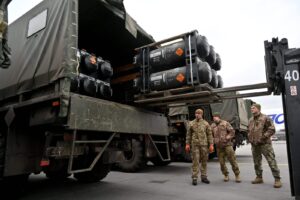
The head of the US Department of State’s Interagency Assistance Department, Daphne Rand, has confirmed that Washington intends to provide Ukraine with an additional $9.9bn in budget support.
“The U.S. has provided $13 billion in budget support to the government of Ukraine, and we are working with Congress to provide another $9.9 billion in the coming months,” Rand told reporters.
She added that Washington “remains committed to working with the government of Ukraine to maintain its operational capacity and provide additional budget support as needed.”
The Washington Post reported earlier this week that the U.S. government is working to have Congress approve an additional $10 billion military aid package for Ukraine.
The newspaper noted that the next military aid package is expected to be announced next week, almost simultaneously with the announcement of additional sanctions against Russia.
At the same time, the newspaper wrote that a number of U.S. officials who visited Ukraine recently told Kiev that despite promises to support Ukraine “as long as necessary,” Washington expects to use the aid already provided more effectively.
Rand did not say what was planned to be included in the new aid package to Kiev. At the same time, U.S. Defense Secretary Lloyd Austin said on the sidelines of a contact group meeting on Ukraine’s defense in Brussels that the West’s current urgent task is to provide Kiev with air defense equipment.
“We know that Russia has a significant number of aircraft and a lot of capacity,” he told reporters. – That’s why we stressed that we need to do everything in our power to provide Ukraine with as much air defense capability as possible.”